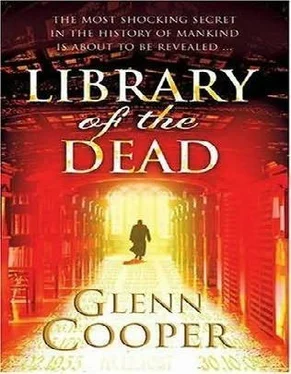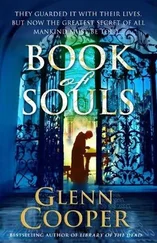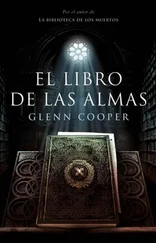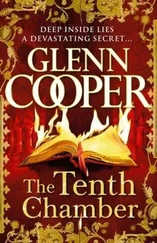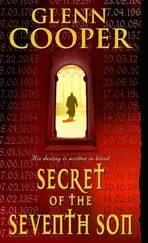Glenn Cooper - Library of the Dead
Здесь есть возможность читать онлайн «Glenn Cooper - Library of the Dead» весь текст электронной книги совершенно бесплатно (целиком полную версию без сокращений). В некоторых случаях можно слушать аудио, скачать через торрент в формате fb2 и присутствует краткое содержание. Жанр: Триллер, на английском языке. Описание произведения, (предисловие) а так же отзывы посетителей доступны на портале библиотеки ЛибКат.
- Название:Library of the Dead
- Автор:
- Жанр:
- Год:неизвестен
- ISBN:нет данных
- Рейтинг книги:3 / 5. Голосов: 1
-
Избранное:Добавить в избранное
- Отзывы:
-
Ваша оценка:
- 60
- 1
- 2
- 3
- 4
- 5
Library of the Dead: краткое содержание, описание и аннотация
Предлагаем к чтению аннотацию, описание, краткое содержание или предисловие (зависит от того, что написал сам автор книги «Library of the Dead»). Если вы не нашли необходимую информацию о книге — напишите в комментариях, мы постараемся отыскать её.
Library of the Dead — читать онлайн бесплатно полную книгу (весь текст) целиком
Ниже представлен текст книги, разбитый по страницам. Система сохранения места последней прочитанной страницы, позволяет с удобством читать онлайн бесплатно книгу «Library of the Dead», без необходимости каждый раз заново искать на чём Вы остановились. Поставьте закладку, и сможете в любой момент перейти на страницу, на которой закончили чтение.
Интервал:
Закладка:
"My instructions are to return you to Aldershot."
"Why is that, if I may ask?"
"Those are my instructions."
Atwood had been in the army long enough to know an immovable object when he saw one, so he saved his breath. He supposed solicitors were drawing up secrecy agreements and that all would be well.
As the van squeaked and bucked on its worn suspension, he tried to think pleasant thoughts about his wife and his children, who would be overjoyed at his return. He thought about a good meal, a hot bath, and resuming his reassuringly pedestrian academic duties. Vectis would by necessity disappear down a deep well, his notes and photographs confiscated, his memories expunged, practically speaking. He imagined he might have furtive chats with Beatrice over a glass of sherry in his rooms at the museum, but their heavy-handed confinement had achieved its desired effect: he was scared. Far more scared than ever during the war.
When he returned to the locked barracks, it was nighttime and his comrades surrounded him like photographers swarming a film star. A pale, dispirited lot, they had lost weight and were irritable, fed up, and ill with worry. Beatrice was housed separately from the men but was allowed to stay with them during the day in a common room where their minders brought them colorless army grub. Martin, Timothy, and Dennis played hand after dreary hand of gin rummy, Beatrice fumed and swore at the guards, and Ernest sat in the corner stroking his hands in an agitated, depressive state.
They had all pinned their hopes on Atwood's foray to London, and now that he was back, demanded to know every detail. They listened, rapt, as he recounted his conversation with Major General Stuart and applauded and wept when he told them their release was imminent. It was only a matter of working through government secrecy agreements for signature. Even Ernest perked up and pulled his chair closer, the tension in his jaw slackening.
"You know what I'm going to do when I get back to Cambridge?" Dennis asked.
"We're not interested, Dennis," Martin said, shutting him up.
"I'm going to take a bath, put on clean clothes, go to the jazz club and introduce myself to loose women."
"He said we're not interested," Timothy said.
They spent the next morning waiting impatiently for news of their release. At lunchtime an army private entered with a tray and laid it on a communal table. He was a dull humorless lad whom Beatrice loved to torture. "Here, you dimwitted wanker," she said. "Get us a couple of bottles of wine. We're going home today."
"I'll have to check, miss."
"You do that, sonny. And check to see if your brains have spilled out your ears."
Major General Stuart picked up his ringing phone at his office in Aldershot. It was a call from London. The muscles of his hard face, fixed with disdain, didn't move. The exchange was short, to the point. There was no need for exposition or clarification. He signed off with a "Yes, sir," and pushed his chair away from his desk to carry out his orders.
The lunch was unappetizing but they were hungry and eager. Over stale rolls and glutinous spaghetti, Atwood, a man of great descriptive powers, told them everything he could recall about Churchill's famed underground bunker. Midway through their meal the private returned with two uncorked bottles of wine.
"As I live and breathe!" Beatrice exclaimed. "Private Wanker came through for us!" The lad put the bottles down and left without a word.
Atwood did the honors, pouring the wine into tumblers. "I would like to propose a toast," he said, turning serious. "Alas, we will never be able to speak again of what we found at Vectis, but our experience has forged among us an eternal bond that cannot be torn asunder. To our dear friend, Reggie Saunders, and to our bloody freedom!"
They clinked glasses and gulped the wine.
Beatrice made a face. "Not from the officers' mess, I shouldn't think."
Dennis started seizing first, perhaps because he was the smallest and lightest. Then Beatrice and Atwood. In seconds all of them had slumped off their chairs and were convulsing and gurgling on the floor, bloody tongues clamped between teeth, eyes rolling, fists clenched.
Major General Stuart came in when it was over and wearily surveyed the sorry landscape. He was bone-tired of death but there was no more obedient soldier in His Majesty's Army.
He sighed. There was heavy lifting to do and it would be a long day.
The general led a small contingent of trusted men back to the Isle of Wight. Atwood's excavation site had been cordoned off and the cutting covered by a large field headquarters tent, shielding it from view.
Abbot Lawlor had been told by a military man that Atwood's party had discovered some unexploded ordnance in their trench and were evacuated to the mainland for safety. In the intervening twelve days, a steady flow of army transit lorries were ferried to the island by Royal Navy barges, and one by one the heavy vehicles rumbled up to the tent. Squaddies who had no idea of the significance of what they were handling did the backbreaking work around the clock of hauling wooden crates out of the ground.
The general entered the library vaults, the clop of his boots reverberating sharply. The rooms were stripped bare, row after row of towering empty bookcases. He stepped over the Elizabethan skeleton with complete disinterest. Another man might have tried to imagine what transpired there, tried to understand how it was possible, tried to wrestle with the philosophical vastness of it all. Stuart was not that man, which perhaps made him ideal for the job. He only wanted to return to London in time to get to his club for a scotch whiskey and a rare beefsteak.
When his walk-through was done, he would pay a visit to the abbot and commiserate about the terrible mistake the army had made: that they'd believed they had cleared all the ordnance before allowing Atwood's group to return. Unfortunately, it seems they missed a German five-hundred-pounder.
Perhaps a mass in their honor would be appropriate, they would somberly agree.
Stuart had the area cleared and let his demo man finish the wiring. When the percussion bombs went off, the ground shook seismically and tons of medieval stones collapsed in on their own weight.
Deep within the pancaked catacombs, the remains of Geoffrey Atwood, Beatrice Slade, Ernest Murray, Dennis Spencer, Martin Bancroft, and Timothy Brown would lie for eternity beside the bones of generations of ginger-haired scribes whose ancient books were packed into a convoy of olive-green lorries streaming toward a U.S. Air Force base in Lakenheath, Suffolk, for immediate transport to Washington.
JULY 29, 2009
W ill's hangover was so mild it almost didn't qualify as one. It was more like a light case of the flu that could be cleared up in an hour by a couple of Tylenol.
The night before, he figured he'd drop off the deep end, bump along the bottom for a good long time and not surface until he was nearly drowned. But a couple of drinks into his planned bender he got angry, angry enough to rev down the self-pity and keep the flow of scotch at a steady state where his input matched his metabolism. He leveled off and engaged in largely rational thought for much of the night instead of the usual volatile nonsense that masqueraded as logic, quickly forgotten. During this functional interlude, he called Nancy and arranged to meet early.
He was already at one of the Starbucks near Grand Central, drinking a venti, when she arrived. She looked worse than him.
"Good commute?" he quipped.
He thought she wanted to cry and half considered giving her a hug, but that would have been a first-a public show of affection.
"I got a nonfat latte for you," he said, sliding the cup. "It's still hot." That nugget set her off. Tears started flowing. "It's only a cup of coffee," he said.
Читать дальшеИнтервал:
Закладка:
Похожие книги на «Library of the Dead»
Представляем Вашему вниманию похожие книги на «Library of the Dead» списком для выбора. Мы отобрали схожую по названию и смыслу литературу в надежде предоставить читателям больше вариантов отыскать новые, интересные, ещё непрочитанные произведения.
Обсуждение, отзывы о книге «Library of the Dead» и просто собственные мнения читателей. Оставьте ваши комментарии, напишите, что Вы думаете о произведении, его смысле или главных героях. Укажите что конкретно понравилось, а что нет, и почему Вы так считаете.
